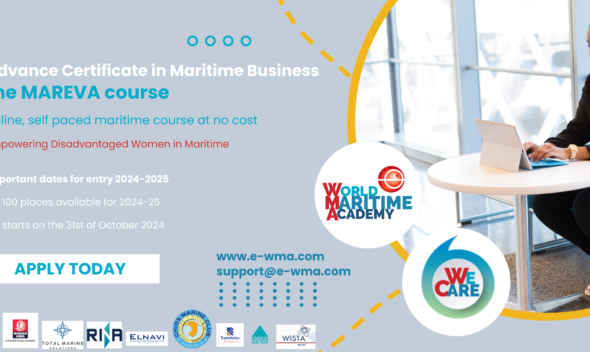Inspiring and Guiding the Next Generation of Maritime Professionals
This article explores the key aspects of attracting and nurturing future maritime professionals, recognizing the crucial role of education, technology, and sustainability in shaping a vibrant and dynamic industry.
For further insights or to discuss how your organization can contribute to this endeavor, feel free to reach out (support@e-wma.com ).
The maritime industry, often referred to as the lifeblood of global trade, is a sector teeming with opportunities and challenges. With over 90% of world trade carried by sea, the maritime profession is critical to the global economy and to our everyday lives.
However, as the industry faces a unique set of challenges: evolving technologies, environmental concerns, and a shortage of skilled professionals.
To ensure a vibrant future, it is essential to inspire and guide the next generation of maritime professionals. But what does it take to do this effectively?
Understanding the Modern Maritime Landscape
Before exploring inspiration and guidance strategies, it’s crucial to understand the current landscape of the maritime industry. The field has dramatically transformed over the past few decades, driven by technological advancements such as autonomous ships, digitalization, and green technologies.
This evolution demands a new breed of maritime professionals who are not only skilled seafarers but also adept at technology, problem-solving, and sustainability.
Key Strategies to Inspire and Guide Future Maritime Professionals
- Promoting Awareness and Interest
- Early Engagement:
Introducing young minds to the wonders of the maritime world can ignite their curiosity and interest.
Programs in schools that highlight maritime careers, field trips to ports, and interactive experiences can plant the seeds of a maritime passion.
Organizations can collaborate with educational institutions to integrate maritime studies into the curriculum and offer extracurricular activities like model shipbuilding and marine ecology clubs.
- Outreach and Visibility:
Media plays a significant role in shaping perceptions. Documentaries, social media campaigns, and showcasing maritime success stories can portray the industry as dynamic and vital. Creating engaging content that depicts life at sea, the thrill of navigation, and the importance of maritime trade can captivate the imagination of young audiences.
- Providing Robust Education and Training
- Specialized Education:
Maritime academies, universities and professional development organizations offering specialized courses in maritime studies, nautical science, and marine engineering are fundamental. These institutions need to continuously update their curricula to reflect the latest industry trends and technologies. Collaborations with industry partners can ensure that the educational content is practical and relevant.
- Apprenticeships and Internships:
Practical experience is invaluable. Apprenticeship programs that combine classroom learning with hands-on experience at sea provide students with a comprehensive understanding of the profession. Internships with shipping companies, port authorities, and maritime service providers offer insights into various career paths and industry operations.
- Mentorship and Role Models
- Creating Mentorship Networks:
Establishing mentorship programs where seasoned professionals guide newcomers can be incredibly beneficial.
Mentors provide advice, share experiences, and offer support as new entrants navigate their careers.
These relationships can inspire confidence and provide a sense of belonging within the maritime community.
- Highlighting Role Models:
Success stories and profiles of diverse individuals who have excelled in the maritime field can serve as powerful motivators.
Showcasing leaders, innovators, and everyday heroes in the industry helps young people see the potential for their own success and understand that the maritime world is accessible to all.
- Emphasizing Technology and Innovation
- Tech-Forward Mindset:
Today’s youth are digital natives. Highlighting the technological aspects of modern maritime careers can attract tech-savvy individuals. The industry’s shift towards automation, cybersecurity, and advanced navigation systems makes it an exciting field for those interested in technology.
- Encouraging Innovation:
Fostering a culture of innovation within maritime education and training can encourage creative problem-solving. Competitions, hackathons, and innovation labs focused on maritime challenges can engage students and young professionals, stimulating their interest in making impactful contributions to the industry.
- Advocating for Sustainability and Environmental Responsibility
- Green Maritime Initiatives:
The next generation is deeply concerned about environmental issues. Promoting the industry’s efforts towards sustainability, such as cleaner fuels, waste reduction, and marine conservation, aligns with their values. Educating young professionals about the importance of environmental stewardship and their role in advancing sustainable practices can inspire them to join the cause.
- Integrating Sustainability in Curriculum:
Educational programs should incorporate modules on maritime environmental impact, regulations, and sustainable practices. This not only raises awareness but also equips future professionals with the knowledge to implement green initiatives in their careers.
- Sharing Real Stories from Maritime Professionals
To truly capture the imagination and interest of the next generation, nothing is more powerful than hearing directly from those who live and breathe the maritime life.
Soon you will find real stories of what it takes for various roles within the industry, shared by the professionals themselves on the WMA site : Shaping the Future of Shipping Series .
- Offering Career Development and Growth Opportunities
- Continuous Learning and Development:
The maritime industry must support continuous professional development. Offering opportunities for further education, certifications, and training in emerging technologies keeps professionals up-to-date and ready to advance their careers.
- Pathways to Leadership:
Clear career pathways and opportunities for advancement are crucial for retaining talent. Providing leadership training, cross-functional experiences, and exposure to different areas of the industry can help young professionals envision a long-term future in maritime.
The Role of Industry Stakeholders
To effectively inspire and guide the next generation, a collaborative effort among all industry stakeholders is essential:
Shipping Companies:
Investing in talent development programs and partnering with educational institutions can create a steady pipeline of skilled professionals.
Government and Regulatory Bodies:
Policies and incentives that support maritime education and career development can make the industry more attractive to young talent.
Maritime Organizations and Associations:
These entities can play a pivotal role in advocacy, networking, and providing resources for professional growth and development.
Educational & Training Institutions:
Updating curricula, offering hands-on experiences, and fostering industry connections are critical to preparing students for maritime careers.
Inspiring and guiding the next generation of maritime professionals is not just about filling roles in an industry; it is about nurturing a passion for the sea and shaping the future of global trade and sustainability. By promoting awareness, providing robust education, fostering mentorship, embracing technology, advocating for sustainability, and offering growth opportunities, we can ensure that the maritime industry continues to thrive with a skilled, innovative, and dedicated workforce. The future of the maritime profession rests in the hands of today’s youth, and it is our collective responsibility to steer them towards a horizon full of possibilities.
This article explores the key aspects of attracting and nurturing future maritime professionals, recognizing the crucial role of education, technology, and sustainability in shaping a vibrant and dynamic industry.
For further insights or to discuss how your organization can contribute to this endeavor, feel free to reach out (support@e-wma.com ).

Also read: Attracting the next generation to shipping













